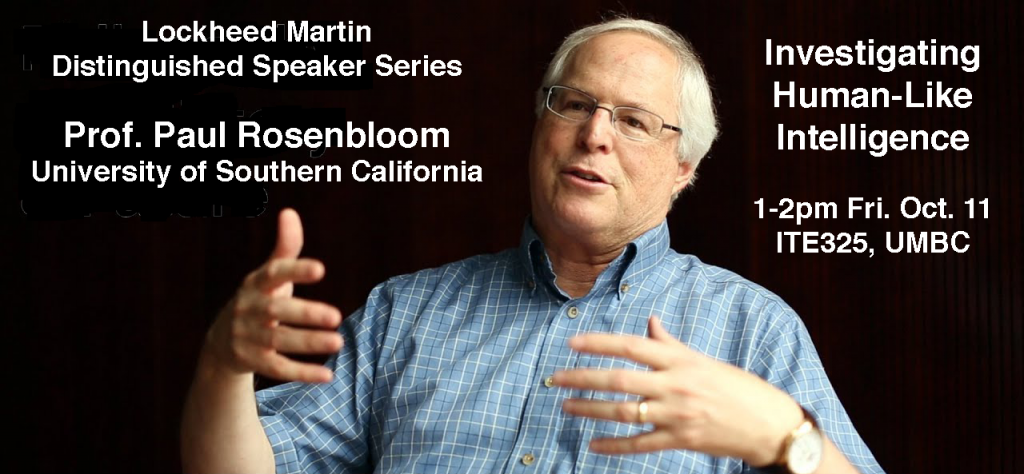
Lockheed Martin Distinguished Speaker Series
Three Related Takes on Investigating Human-Like Intelligence:
Cognitive Architectures, a Common Model of Cognition, and Dichotomic Maps
Dr. Paul S. Rosenbloom
Professor of Computer Science and Director of Cognitive Architecture Research, Institute for Creative Technologies
University of Southern California
1:00-2:00pm Friday, 11 October 2019, ITE 325b, UMBC
This talk explores a trio of related takes on how to investigate the nature of human-like intelligence. The first concerns cognitive architectures – implemented models of the fixed structure and processes that yield natural and artificial minds – with a drill down to Sigma, an attempt at a deep synthesis across what has been learned over the past four decades on (what started as) high-level symbolic cognitive architectures versus the low-level graphical/network technologies of probabilistic graphical models (such as Bayesian networks) and neural networks. The second concerns a more abstract attempt at specifying a Common Model of Cognition that yields an evolving community consensus over what must be part of any cognitive architecture for human-like intelligence. The final take concerns an even more abstract (and speculative) attempt at understanding more deeply the space of approaches to intelligence – framed as maps resulting from cross products among core cognitive dichotomies – along with how such maps may help to understand and structure the capabilities required for (human-like) intelligence.
Paul Rosenbloom is a professor of computer science in the Viterbi School of Engineering at the University of Southern California (USC) and director for cognitive architecture research at USC’s Institute for Creative Technologies (ICT). He was a member of USC’s Information Sciences Institute for two decades, ending as its deputy director, and earlier was on the faculty at Carnegie Mellon University and Stanford University (where he had a joint appointment in Computer Science and Psychology). His research concentrates on cognitive architectures (models of the fixed structures and processes that together yield a mind), the Common Model of Cognition (an attempt at developing a community consensus concerning what must be part of a human-like mind), and on computing as a scientific domain (understanding the computing sciences as akin to the physical, life and social sciences). He is a fellow of the Association for the Advancement of Artificial Intelligence (AAAI), the Association for the Advancement of Science (AAAS), and the Cognitive Science Society; and with J. Laird was recently awarded the Herbert A. Simon Prize for Advances in Cognitive Systems. He has served as councilor and conference chair for AAAI; chair of the Association for Computing Machinery Special Interest Group on Artificial Intelligence; and president of the faculty at USC.